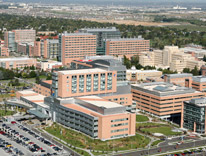Stormwater at CU Anschutz
Iain Baker | Infrastructure Safety and Compliance Apr 4, 2023
Our Stormwater Program
To minimize pollutants transported by stormwater runoff, the University of Colorado Denver | CU Anschutz Medical Campus implements programs in accordance with the Non-Standard Colorado Municipal Separate Storm Sewer System (MS4) Permit. The university is required to administer a Non-Standard Municipal Separate Storm Sewer System (MS4) permit, Colorado Department of Public Health and Environment (CDPHE) Permit #COR-070075. The University of Colorado Denver | CU Anschutz Medical Campus has a stormwater program which includes routine inspections on water quality facilities, targeting of excess nutrients, and education and outreach components. For more information on Colorado MS4 permits, see the MS4 General Permits section of the CDPHE website.
Key Program Elements
- Education and Outreach
- Construction Site Erosion and Sediment Control
- Design Standards and Ongoing Maintenance
- Pollution Prevention and Good Housekeeping
- Illicit Discharge Detection and Elimination
Public Review & Input
Public involvement is a critical part of the success of our stormwater program. University of Colorado Denver | CU Anschutz Medical Campus seeks public involvement in the following ways:
Stormwater Pollution Prevention Program
To request a copy of our Program Description Document (PDD), which outlines the university's Stormwater Pollution Prevention Program, please contact the Regulatory Compliance Manager. If you have any questions, concerns or ideas about our stormwater pollution prevention program, please also feel free to contact the Regulatory Compliance Manager.
Illicit Discharge Detection and Elimination
In accordance with state regulations, the University of Colorado Denver | CU Anschutz Medical Campus runs an Illicit Discharge Detection and Elimination program which seeks to identity and eliminate any potential illicit discharges throughout the campus. For more information on illicit discharges or to report an illicit discharge, please see the Discharge Detection page.
Targeted Pollutants (TMDLs)
The University of Colorado Denver | CU Anschutz Medical Campus discharges to Barr Lake and Milton Reservoir which have a pH and dissolved oxygen total maximum daily load (TMDL). This nutrient loading is controlled by targeting phosphorus with the TMDL seeking a 20% reduction in phosphorus loads on these waters. For more information on TMDLs and what we do to reduce phosphorous loading on campus, see Pollution Prevention.